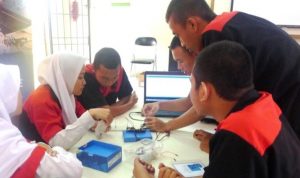Tailor-made solutions for sustainable development in Southern Africa, Southeast Asia and the MENA region
The Deutsche Gesellschaft für Internationale Zusammenarbeit (GIZ) GmbH works with companies in the areas of sustainable development and inclusive business. On behalf of the German Federal Ministry for Economic Cooperation and Development (BMZ), GIZ has established a global network of Responsible and Inclusive Business Hubs (RIBHs) in Cairo, Jakarta and Pretoria.
Our approach
The RIBHs aim to create a win-win situation, in which people at the Base of the Pyramid (BoP) are integrated into the core business practices of companies through inclusive business (IB) models. To foster sustainable and inclusive business activities, the RIBHs develop training and advisory formats and implement these as pilot projects. They support established companies, social enterprises and start-ups in developing IB models, and integrate companies and other relevant actors into networks. The RIBHs therefore serve as mediators, bringing together German development cooperation, the local and international private sector, and on-site intermediaries.
The RIBHs advise companies and start-ups on how to design and implement their business models in a sustainable and inclusive manner. With their regional presence, expertise, and established networks and partner structures, they not only advise and develop contacts between local and international businesses, but also serve as a point of contact for intermediaries and regional actors.
The three RIBHs
All three hubs operate in the areas of tourism and agriculture. Additionally, each hub has a focus on a topic that is especially relevant for the region in which they operate:
The RIBH MENA (Cairo, Egypt) develops and pilots IB models and sustainability concepts together with businesses in the Middle East and North Africa (MENA) region. By cooperating closely with relevant actors such as the icecairo innovation hub, the RIBH focuses on supporting local small and medium-sized enterprises (SMEs), start-ups and entrepreneurs. The hub organises awareness-raising events and networking formats, and implements pilot projects in cooperation with larger companies (e.g. the Sustainable Start-Up Lab), with a special focus on tourism, agriculture and renewable energies.
Contact: Michael Janinhoff: michael.janinhoff@giz.de

The RIBH SADC (Pretoria, South Africa) advises companies in the Southern African Development Community (SADC) on IB project approaches. It prioritises food and nutrition, and agriculture, and strives to involve local municipalities in sustainable tourism. For example, with its activities, the RIBH has provided effective training to various agricultural cooperatives in the areas of quality management, organic farming and balancing supply and demand.
Contact: Rebecca Szrama: rebecca.szrama@giz.de

The RIBH SEA (Jakarta, Indonesia) advises local and international businesses in the South-East Asia (SEA) region. The team focuses on advisory services and on designing IB models for the agriculture and tourism sectors as well as for innovative information and communication technologies. The hub also supports members of Indonesia’s biggest employers’ association, for example, in strategically configuring their CSR activities, and works with them to identify potentials for IB models.
Contact: Sarah Schwepcke: sarah.schwepcke@giz.de


More information on www.giz.de/business-hubs
This blog is part of the September 2016 series on Inclusive Business Development Services, in partnership with the Inclusive Business Accelerator. Don’t miss the whole series on support available to inclusive business from practitioners, donors and intermediaries including Afrilabs, DFID, Endeva, EY and many more…